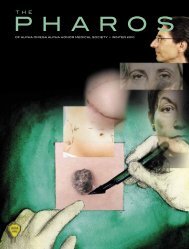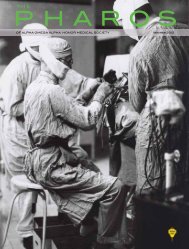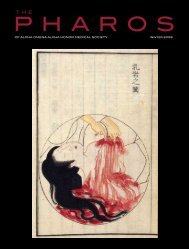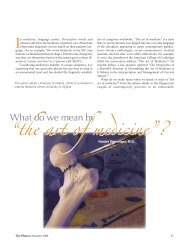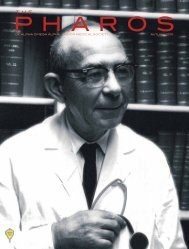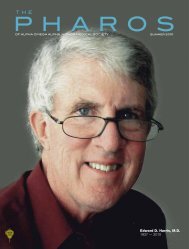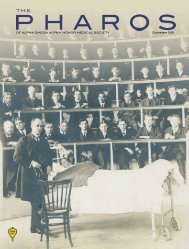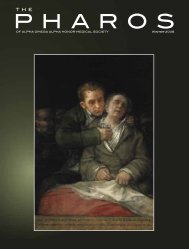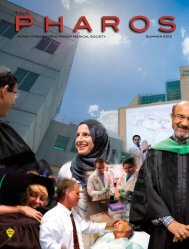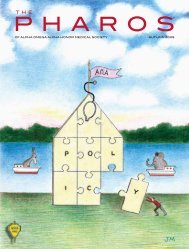The Pharos - Alpha Omega Alpha
The Pharos - Alpha Omega Alpha
The Pharos - Alpha Omega Alpha
You also want an ePaper? Increase the reach of your titles
YUMPU automatically turns print PDFs into web optimized ePapers that Google loves.
Daylon<br />
clearly see the nasal flaring and retractions.<br />
This infant is still fairly tachypnic<br />
and will remain on oxygen. . . .” Daylon<br />
lies asleep in the hospital crib, unaware<br />
that he is on display. His mother<br />
watches the resident intently as he objectively<br />
describes her child. <strong>The</strong> rest<br />
of the students and I crowd around the<br />
crib, like so many gawking onlookers<br />
at a fire.<br />
In medical school, there are never<br />
enough chairs. In the patient rooms<br />
there is usually only one or two, often<br />
occupied by family members. Any available<br />
chairs go to the attendings or the<br />
residents; the medical students stand.<br />
I never know exactly how to hold my<br />
arms. Crossing them seems too stern,<br />
hands in pockets seems too casual, and<br />
behind the back makes me think of<br />
decrepit old high school science teachers<br />
walking between the rows of desks<br />
while proctoring exams. Most of the<br />
rest of the students have opted for the<br />
behind-the-back pose, hovering over<br />
the crib. I pray that Daylon stays asleep.<br />
I pray that he doesn’t awake to see a ring<br />
of yellow mouthless specters peering<br />
down on him.<br />
“So do you have any further questions?”<br />
<strong>The</strong> resident is looking at us. He<br />
has decided not to examine Daylon any<br />
further because he might wake him. <strong>The</strong><br />
mother looks relieved.<br />
“Have they told you how long you<br />
will be here?” one student asks the<br />
mother.<br />
Daylon’s mom looks pleadingly at the<br />
resident and says, “I am not sure yet,<br />
they haven’t really told me.”<br />
<strong>The</strong> resident replies that he thinks<br />
Daylon will likely be able to go home<br />
in a day or two. He adds that he feels<br />
comfortable sending Daylon home so<br />
soon because he is confident that his<br />
mother knows how to watch him and<br />
will be quick to bring him back if his<br />
health deteriorates.<br />
In other words, she is a good mother,<br />
so we will release Daylon; if she were a<br />
bad mother he would have to stay longer.<br />
At that, the mother smiles her first<br />
genuine smile of the day. I see pride in<br />
her face.<br />
“Well, if there are no further questions,<br />
shall we move on?” the resident<br />
says.<br />
I want to scream, “Wait! I don’t want<br />
to move on.” I have questions, millions<br />
of them: Who are you? What do you<br />
want for your son? What does this all<br />
mean to you and Daylon? Tell me the<br />
poetry that is your life. Give me the<br />
words to say to the tortured soul of<br />
a mother at three o’clock in morning<br />
when her dreams and aspirations live<br />
on the fragile breaths of a dying infant.<br />
How do I be a good doctor to you and<br />
to Daylon?<br />
But I don’t ask. I don’t know how<br />
to ask. Anatole Broyard in his essay<br />
“Doctor, talk to me,” says his ideal doctor<br />
would be Virgil, leading him through<br />
his purgatory or inferno, pointing out<br />
the sights as they go. 1 Though I have<br />
always liked the idea, somehow I don’t<br />
think Daylon or his mother need a<br />
Virgil. Perhaps the Virgin Mary would<br />
be a better guide for them—the consummate<br />
compassionate maternal deity.<br />
Who better to understand<br />
their suffering? Who<br />
better to share<br />
their burdens? <strong>The</strong>y don’t teach that in<br />
medical school. I want to ask Daylon<br />
and his mother to teach me, but I don’t.<br />
It is time for us to move on to the next<br />
specimen.<br />
We thank her as we leave the room.<br />
She asks us to turn down the light. As<br />
the room goes dark, I look back one last<br />
time at Daylon and his mother, bathed<br />
in the light of the monitors surrounding<br />
the crib. Her head is bent toward her<br />
child, our intrusion already forgotten.<br />
In the dim light, I see her kiss Daylon<br />
on the forehead to ease his sleep and<br />
assuage her own worries. For the first<br />
time I see her for who she is, a modern<br />
Madonna caring for the light of her<br />
world.<br />
Reference<br />
1. Broyard A. Doctor, talk to me. Minn<br />
Med 1998; 81: 8–11, 50.<br />
<strong>The</strong> author’s address is:<br />
28378 SW Wagner Street<br />
Wilsonville, Oregon 97070<br />
E-mail: jchiovaro@gmail.com<br />
30 <strong>The</strong> <strong>Pharos</strong>/Autumn 2012



